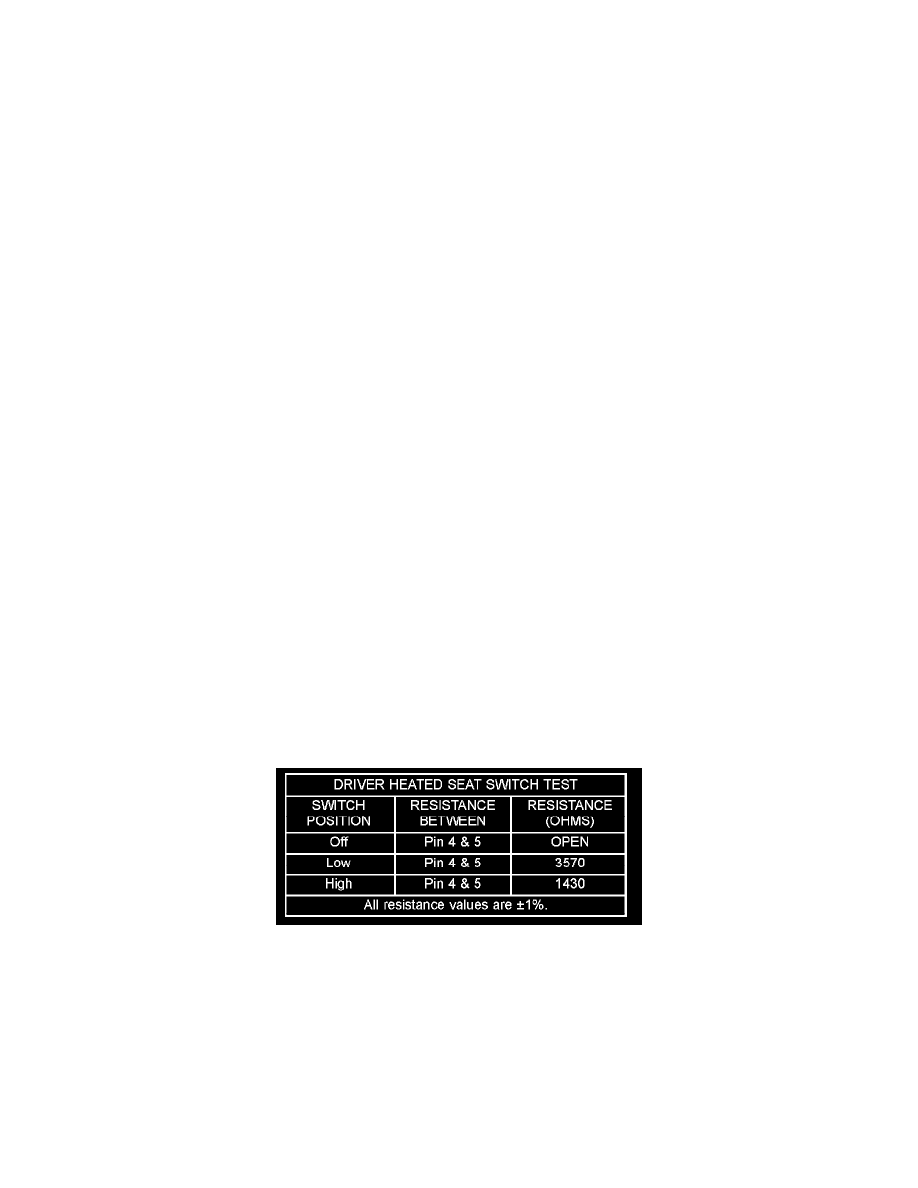Grand Caravan V6-3.3L VIN R (2005)

Seat Heater Switch: Testing and Inspection
DRIVER HEATED SEAT SWITCH
Refer to the appropriate wiring information for complete circuit schematic or connector pin-out information.
WARNING: REFER TO THE RESTRAINTS OF THIS MANUAL BEFORE ATTEMPTING ANY STEERING WHEEL, STEERING
COLUMN, SEAT OR INSTRUMENT PANEL COMPONENT DIAGNOSIS OR SERVICE. FAILURE TO TAKE THE PROPER
PRECAUTIONS COULD RESULT IN ACCIDENTAL AIR-BAG DEPLOYMENT AND POSSIBLE PERSONAL INJURY.
CHECKING SWITCH SIGNAL AND WIRING AT THE MODULE - EARLY BUILD VEHICLES
1. Disconnect and isolate the battery negative cable.
2. Access and disconnect the gray 4-way connector from the heated seat module. Visually inspect wiring terminals for damage that would prevent
positive connection. If not OK, repair or replace the necessary components.
3. Connect the battery negative cable. Place the heated seat switch in the LO position. Using an Ohmmeter, check the resistance between cavities 2
and 3 of the gray connector noted above. Resistance should be about 3.5 kilohms (3500 ohms). If not OK, check resistance directly at switch, as
noted below. If OK, proceed to the next step. If not OK, replace the faulty switch.
4. Place the heated seat switch in the HI position. Using an ohmmeter, check the resistance between cavities 2 and 3 of the gray connector noted
above. Resistance should be about 1.4 kilohms (1400 ohms). If not OK, check resistance directly at the switch, as indicated in the Heated Seat
Switch Test Table. If OK, proceed. If not OK replace the faulty switch.
5. With the system ON in the HI position, check for battery voltage and ground at cavities 4 and 1. If OK, proceed with testing remaining
components. If not OK, repair open or shorted wiring.
CHECKING SWITCH SIGNAL AND WIRING AT THE MODULE - LATE BUILD VEHICLES
1. Disconnect and isolate the battery negative cable.
2. Access and disconnect the black 8-way connector from the main seat harness. Visually inspect wiring terminals for damage that would prevent
positive connection. If not OK, repair or replace the necessary components.
3. Connect the battery negative cable. Place the heated seat switch in the LO position. Using an Ohmmeter, check the resistance between cavities 3
and 5 of the black 8-way connector noted above. Resistance should be about 3.5 kilohms (3500 ohms). If not OK, check resistance directly at
switch, as noted below. If OK, proceed to the next step. If not OK, replace the faulty switch.
4. Place the heated seat switch in the HI position. Using an ohmmeter, check the resistance between cavities 3 and 5 of the black 8-way connector
noted above. Resistance should be about 1.4 kilohms (1400 ohms). If not OK, check resistance directly at the switch, as indicated in the Heated
Seat Switch Test Table. If OK, proceed. If not OK replace the faulty switch.
5. With the system ON in the HI position, check for battery voltage and ground at cavities 4 and 5. If OK, proceed with testing remaining
components. If not OK, repair open or shorted wiring.
CHECKING SWITCH ONLY
1. Disconnect and isolate the battery negative cable. Remove the center bezel from the instrument panel. Check for continuity between the ground
circuit cavity (#10) of the instrument panel center bezel switch electrical connector and a good ground. There should be continuity. If OK, go to
Step 2. If not OK, repair the open ground circuit to ground as required.
2. Connect the battery negative cable. Turn the ignition switch to the On position. Check for battery voltage at the fused ignition switch output (run)
circuit cavity of the instrument panel center bezel switch electrical connector (#4). If OK, turn the ignition switch to the Off position, and go to
Step 3. If not OK, repair the open fused ignition switch output (run) circuit as required.
